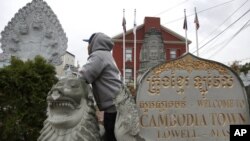Asian American groups are objecting to the Trump administration’s efforts to step up deportations of Cambodians, as dozens of refugees with criminal convictions are being ordered to report to federal officials next week for removal.
At least 20 people in California have been served notices to report to U.S. Immigration and Customs Enforcement to begin the deportation process, according to Ny Nourn, a San Francisco-based community advocate with the Asian Americans Advancing Justice-Asian Law Caucus. The state is home to the largest population of Cambodians in the U.S.
In Massachusetts, the state with the nation’s second largest Cambodian community, at least 10 residents have received them, said Bethany Li, director of Greater Boston Legal Services’ Asian Outreach Unit.
Cambodians living in Minnesota, Texas, Rhode Island, Washington and Wisconsin have also been issued the orders, said Elaine Sanchez Wilson, a spokeswoman for the Southeast Asia Resource Action Center in Washington, D.C.
Asian American activists are planning demonstrations in San Francisco, Sacramento and Boston next week. They argue that many of those facing deportation served criminal sentences years and in some cases decades ago, when they were troubled young refugees struggling to adjust to a new country after their families fled Cambodia’s brutal Khmer Rouge regime.
“Many of these people have served their time and rebuilt their lives,” said Kevin Lam, an organizer with the Asian American Resource Workshop, which is helping organize Monday’s protest in Boston. “They have families, careers and contribute to their communities.”
The deportations have been happening since about 2002, when Cambodia agreed to begin repatriating refugees convicted of felony crimes in the U.S.
But they’ve risen sharply since President Donald Trump took office and imposed visa sanctions on Cambodia and a handful of other nations in order to compel them to speed up the process.
The result has been a roughly 280% increase, from 29 removals in federal fiscal year 2017 to 110 in federal fiscal year 2018, according to U.S. Immigration and Customs Enforcement data .
Through the current fiscal year, which ends Monday, 80 Cambodians have been removed, the agency told The Associated Press this week. There are nearly 1,800 Cambodians with final removal orders living in the country. The majority have criminal convictions but are on supervised release and not in detention, ICE said.
“ICE fully respects the Constitutional rights of all people to peacefully express their opinions,” the agency said in response to the planned demonstrations. “That being said, ICE remains committed to performing its immigration enforcement mission consistent with federal law and agency policy.”
Asian American organizations say they’re focused on finding ways to get criminal convictions reduced or dropped so that Cambodian refugees can avoid deportation.
Democratic governors in California and Washington state have recently granted pardons to a handful of Cambodians, and at least two Cambodians recently returned to the U.S. after successfully challenging the criminal convictions that had prompted their removal.
A nationwide class action lawsuit challenging immigration raids on the Cambodian community is also pending in a California federal court. A temporary restraining order issued earlier this year in that case requires ICE to give written notice at least two weeks before detaining Cambodian refugees.
Nourn says sending refugees back to Cambodia now only sets them up for failure. Many have little connection to the country, let alone the language and other skills needed to navigate the unfamiliar environment.
Last year, 27-year-old Sophorn San , who had lived most of his life in Rhode Island after he family fled Cambodia in the 1990s, was deported after pleading guilty to a gun charge as a teen. He was struck and killed by a truck in the Cambodian capital city of Phnom Penh only a few months later.
In Lowell, an old mill city in Massachusetts where about 15% of residents are of Cambodian descent, a 40-year-old refugee from Cambodia said he’s lived almost half his life with a removal order hanging over him.
The man, who requested anonymity because he’s trying to resolve his immigration status, said he came to the U.S. when he was four years old, got involved in a street gang as a youth and received felony convictions by the age of 18 that made him deportable.
The man said his attorney has helped him address the old convictions, but he now has to convince immigration officials to reconsider his deportation case. If he’s forced to go back to Cambodia, he said he’d be leaving his family and a nearly two-decade career serving at risk youths to live in a country he’s never known.
“I consider myself an American,” he said. “I have kids that are American, and a wife that is an American citizen. But just because of the past, they can pick you up and deport you at any moment. That’s just insane to me.”







